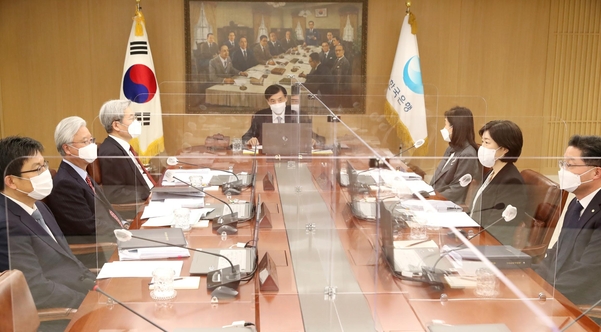Input 2021.01.15 13:44 | Revision 2021.01.15 14:23
Worries about stock’debt investment’… “In case of impact, it may cause difficult loss”
Bank of Korea Governor Lee Ju-yeol said on the 15th that the stock market exceeded the KOSPI 3000 and raised concerns about overheating in the asset market, “The rate of increase is very fast compared to before, but I am concerned that this speeding could greatly shake even a small shock.” .
Governor Lee Ju-yeol said at a press conference after the Monetary Policy Direction meeting that day, “The KOSPI index is rising every day, and it is difficult to determine in advance whether the uptrend is a bubble or not, but there is a possibility that the stock price will be adjusted as market participants’ expectations change.” said.

On that day, the Bank of Korea Financial and Monetary Committee froze the January base rate at 0.50% per year. The freeze of interest rates on this day was decided unanimously by the Financial Services Commission.
Governor Lee also expressed concern about the’debt investment’ craze in the stock market. He said, “The increase in asset prices is a little faster in the light of the real economy and income conditions, and borrowings are increasing significantly in the process,” he said. “Investors can tolerate the expansion of investments based on excessive leverage due to an unexpected shock. “We are concerned that it can cause a difficult level of loss.”
Although concerns about the stock market overheating, such as the speed of the KOSPI rise, were raised, Governor Lee Joo-yeol said he plans to continue the current monetary easing stance. Governor Lee said, “Considering the real economic conditions, changing the stance of interest rate policy or normalizing various easing measures is not a matter to consider now.”
He added, “The difficulties of the vulnerable class of small business owners and self-employed people are quite large, and there is a lot of uncertainty in the future economic recovery trend, and the risk of the affected class is difficult to be resolved in a short time.”
Regarding the liquidity supply measures to support companies struggling with the corona, President Lee said, “The BOK’s liquidity support is not intended to support marginal companies, but focuses on mitigating the difficulty of financing companies facing temporary liquidity shortages. Through this,” The goal is to prevent financial market instability and economic contraction, and I think it has had a significant effect.”
He said, “It is a natural point that the side effects of lifespan of marginal companies may occur due to prolonged support, but if the expiration of temporary measures arrives, we will look at the effects and side effects together and decide whether to end it.” As a result, the face-to-face service industry is quite sluggish, and the difficulties of small business owners, self-employed, and temporary workers who are engaged there are great, so I don’t think it should be hastily picked up applications.”
